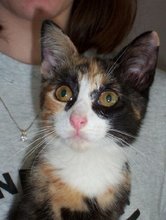I first noticed the head tilt last night but didn't think much of it. This morning we couldn't find her for hours; she didn't show up for breakfast. We scoured the house and finally, at 1 in the afternoon, discovered her curled up in a dark corner in the family room. The symptoms seemed far worse than the night before; I thought she might be having a seizure. It was Sunday. We called our vet's service, but when the doctor hadn't gotten back to us after about an hour, we packed Pearl into the car and headed to an animal emergency center about 20 miles away.
That, as it turned out, was a mistake. Not only did they charge us $500 to run a few tests on Pearl (bloodwork, an X-ray of the stomach to see if she had eaten something poisonous) and then hooked her to an IV, they missed what turned out to be the obvious diagnosis. But we only found that out when we got back home, having left Pearl behind at the emergency vet's. Our vet finally returned our call. "Go back, tell them you want your cat. And when you get her home, call me," he said. God bless Dr. D.
We did as instructed, and got Pearl in to see our vet at 9:15 p.m. Dr. D. advised us that emergency veterinary centers are generally not a wise choice except in the most extreme situations; other than centers in major metropolitan areas (like the Animal Medical Center in New York), the care at these places can be subpar. Then he did what the emergency vet had failed to do: He examined the cat. He had me put her down on the floor so he could see her walk (or attempt to) and he literally got down on his hands and knees to watch her at Pearl-level. When she was back up on the examining table, he looked into her ears and eyes.
She presented, he said, with virtually a textbook case of feline vestibular syndrome, which is a neurological disorder of unknown origin that is something like Meniere's disease in humans. For some reason (also unknown), it strikes most frequently during the summer. Generally, a cat will improve after 72 hours and be completely back to normal in 7 to 14 days, and that of course is what we are hoping for Pearl.
In the meantime, the doctor gave her a valium (sufferers are nauseous and disoriented because the disease affects the nerves of the inner ear, so the sedative will help those symptoms) and tucked her into a cage for overnight observation. If she shows no further or no worse symptoms, it's likely we'll be able to take her home tomorrow.
